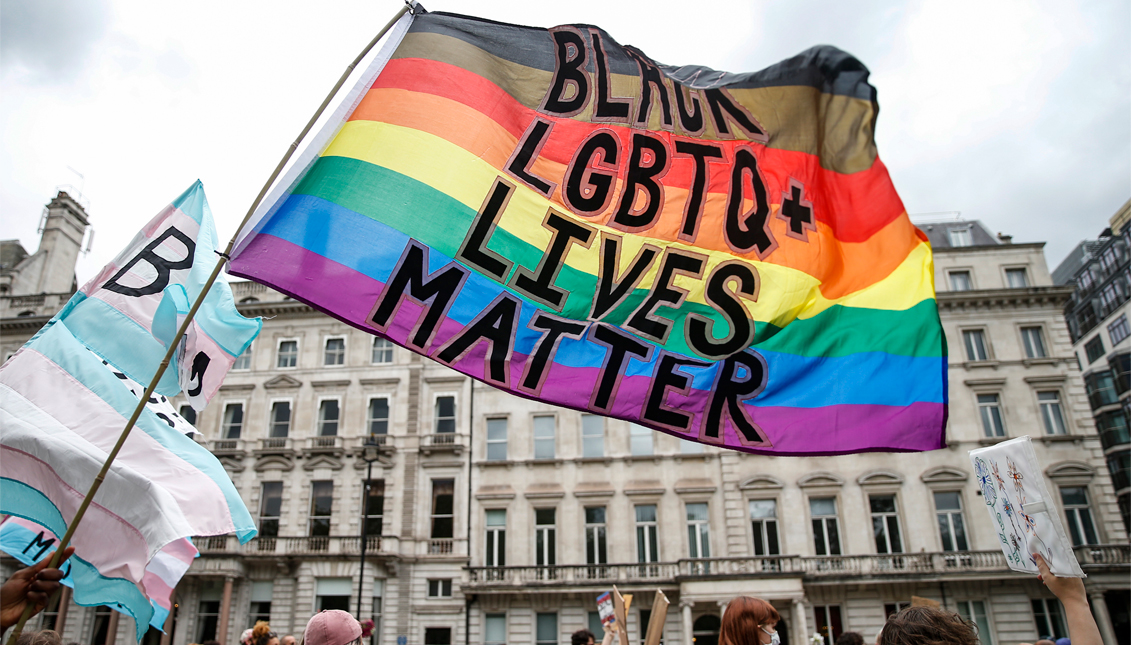
A new app to highlight safe spaces for Black LGBTQ individuals
Lavender Book comes at a time when violence against LGBTQ+ individuals is at an all-time high.
LGBTQ hate crimes and sexual harrassment have been on a steady rise in the U.S. since late 2020 and early 2021. A disproportionate number of those crimes have come against LGBTQ individuals of color.To combat the uptick, a new app called the Lavender Book, has been created to steer Black queer people away from violent areas, and highlight safe businesses and other spaces for them to go.
David Johns, executive director of the National Black Justice Coalition, told NBC News that Black queer and trans people have to worry about things “most people take for granted and don't have to think about.”
“Like whether or not a barber or beautician is going to say something that might be homophobic, or you're going to be denied access to a cake because a baker is going to hide their hate behind religion,” he said.
Since the LGBTQ community has always faced hardships in America for generations, Hughes always dreamed of developing something that could save the lives of Black queer people.
With that in mind, he developed the Lavender Book app, which launched Monday, May 17, and was created in collaboration with Out in Tech, a nonprofit for LGBTQ people who work in the technology field.
The Lavender app is named after the historic Green Book, a resource for Black travelers during the Jim Crow era that identified safe spaces for Black people. The Green Book was first published in 1936.
Now, almost 85 years later, an app has been created for LGBTQ people searching for secure and compatible establishments in different locales.
Whether someone is looking for gender-neutral restrooms or trans-owned shopping establishments, the Lavender Book will provide the results immediately.
“We know how much uncompensated labor goes into finding safe spaces,” Johns told NBC News. “Black LGBTQIA+ folk, and then [Black, Indigenous, and people of color] folks with intersectional identities thereafter, spent a lot of time making phone calls and leveraging community networks to identify places where the likelihood of us being victims of verbal harassment, bias, discrimination or violence associated with actual or assumed sexual identity and gender orientation or expression will happen.”
So far in 2021, there have been 14 trans people killed, with the latest victim being Jaida Peterson, a 29-year-old Black trans woman, according to The Human Rights Campaign.
Peterson was found unresponsive in a hotel room in Charlotte, North Carolina on April 4, and pronounced dead at the scene.
RELATED CONTENT
She is the eighth Black trans woman killed in the past four months, and one of two Black trans women known to be killed this month so far.
Peterson was initially deadnamed and misgendered in police reports and media coverage. Local papers corrected her name and pronouns after friends reached out.
The HRC marked 44 deaths of transgender and gender non-conforming people in 2020, more than in any year since the HRC began tracking LGBTQ violence in 2013.
Another report provided by the HRC also showed that Black LGBTQ and HIV-affected people were 1.4 times more likely to experience physical violence and two times more likely to experience threats and intimidation during incidents of hate violence.
“For so many of us, the spaces we're forced to move through and the world around us is not welcoming,” Johns said.
Sage Grace Dolan-Sandrino told NBC News that as a Black and Latina queer and trans woman, “it is imperative to my survival that I know in what spaces I am safe.”
“Growing up in Washington, D.C., I became familiar with my safe spaces — where to eat, where to shop, and where NOT to,” she said.
But that all changed when she moved from D.C to Upstate N.Y. to go to college. She became completely unfamiliar with the location and therefore, felt completely unsafe.
Dolan-Sandrino said that by using the app, she felt like she could easily feel the sense of normalcy and impact the app would have on LGBTQ people.











LEAVE A COMMENT: